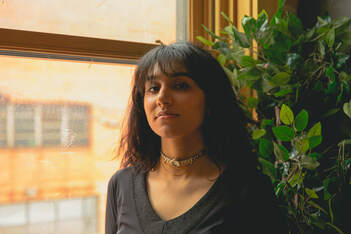Illegal Letters
I read her letters after morning prayer. When I rose my head from the warmth of the prayer mat and sat in the light of the morning. There was a coolness to her writing, like the first cold of a Lahori winter, or the refreshing sip of a sherbet after a day of fasting. Without seeing her I already knew who she was, what her walk was, how she spoke. Her writing struck the paper like lightning, sending waves out of it. I imagined Jamilah to have luscious deep brown hair, I yearned for her photo so I could put a face to the words I constantly read. Were her braids like ours? Draping the sides of her body, tied with bows at the end. While I spoke of the mundane, the routines of life, she spoke of that which I was told never to utter.
I could only imagine her presence brought the same awe to those around her. Her grief was palpable, and I mourned for her loss. In my last letter to her I asked for a photo of her. I scolded myself for days after, wondering if it was too forward. I had sent my photo so she too could put a face to the name. Did I fit her imagination? Did my nose eyes squint with a smile the way she thought I would when I wrote about the adventures we would have? Was my smile a reminder of others she had met from Lucknow, or lineages she knew of?
I wrote to her all the way across these sketched borders, between Pakistan and India, with her being in Rawalpindi and me in Lucknow. We wrote Urdu with the same cadence, it felt as though we were long lost neighbors, dialects indecipherable in the way our letters told stories. For everything I wasn’t, she was.
Her letters slowed in their pace. The last time I received one was almost 4 months ago, read by so many before they reached my hands. We were careful to code what we wanted to say to each other. I tried to imagine her hand moving across the page as I fixated on her writing. How the letters connected, fitting perfectly within imaginary lines on her unlined paper. Was it written in a hurry or did she have all the time in the world to complete her thoughts? Were these words written in corners with little light and little space from the world surrounding her? Her world was busy, her mother had died, she was mourning and still writing inqilabi ideas.
I prayed for her in the early morning, as a sister would, when I woke at dawn and would read what she wrote again. “Pyaari Zeinab…” A whole world was in her writing that was both entirely the same and entirely different from my own. How could you hold back the state of your world from someone as near to you as myself, she would often ask. We are one, do not forget, and thus your problems mine and mine yours.
When her letters were stopped, and withheld, I craved the words she wrote. What was so ineligible to my mind that the state refused to pass it on? Was it the unimaginable care between two recently created borders and their inhabitants? Or Jamilah’s unforsaken womanhood she created for herself?
—
I hid the letters when I read them. Not wanting my mother to see how frequently I would read these words. She was hoping Jamilah would never write back. ‘Improper things’ she would say I was learning. But little did anyone know how frequently I would open them, a portal to another world where my separated jaani was living life for both of us. The folds in the paper softened every time I opened it, how it brought me closer to possibly tearing it but I couldn’t possibly not reread it. In the beginning Jamilah wrote with such formality, utilizing the aap pronoun instead of tum; signaling she was writing to an elder or someone she respected. I quickly told her to drop that, we were soul sisters anyways, formalities were little to be kept in our bonds of love.
At night when I lay awake in my room thinking about the image I painted for her in my last letter. The two of us, awake in bed, sharing jokes and stories in the heat under the fan as we fall asleep in each other’s arms. Whispering so no one can hear us, no one suspecting anything of us, sharing comfort and love in our embrace. Our hair intertwined, knotted together by the time we awoke, like infinite versions of our hands wrapped within each other. A tingle sent down my spine wondering what it would feel like to graze the edges of her body next to mine. The smell of our summer sweat mixing together with the scent of rose oil in our hair, a sweetness I thirsted to experience.
The distance between our cities felt even more vast when I searched for any news about her life in Rawalpindi. I tried aimlessly to find someone who was corresponding with anyone in her neighborhood, hoping they could provide me with an update of her life there. Our days in India passed begrudgingly, with the situation dependent on politics as temperamental as our monsoon rains. But I remained hopeful, in anticipation of a letter soon arriving.
After my end of year exam for 9th grade, I returned home on the bus my parents arranged for. Waiting for me was my mother, grimacing by the door.
khat aaya hain tumhara she scorned
a letter has come for you
I quickly grabbed it and ran to the quietest corner of the home, the washroom. Jamilah had written again and as soon as I read the first line:
Meri pyaari zeinab,
My dearest zeinab
‘
My breath was returned and my heart was at ease.
I could only imagine her presence brought the same awe to those around her. Her grief was palpable, and I mourned for her loss. In my last letter to her I asked for a photo of her. I scolded myself for days after, wondering if it was too forward. I had sent my photo so she too could put a face to the name. Did I fit her imagination? Did my nose eyes squint with a smile the way she thought I would when I wrote about the adventures we would have? Was my smile a reminder of others she had met from Lucknow, or lineages she knew of?
I wrote to her all the way across these sketched borders, between Pakistan and India, with her being in Rawalpindi and me in Lucknow. We wrote Urdu with the same cadence, it felt as though we were long lost neighbors, dialects indecipherable in the way our letters told stories. For everything I wasn’t, she was.
Her letters slowed in their pace. The last time I received one was almost 4 months ago, read by so many before they reached my hands. We were careful to code what we wanted to say to each other. I tried to imagine her hand moving across the page as I fixated on her writing. How the letters connected, fitting perfectly within imaginary lines on her unlined paper. Was it written in a hurry or did she have all the time in the world to complete her thoughts? Were these words written in corners with little light and little space from the world surrounding her? Her world was busy, her mother had died, she was mourning and still writing inqilabi ideas.
I prayed for her in the early morning, as a sister would, when I woke at dawn and would read what she wrote again. “Pyaari Zeinab…” A whole world was in her writing that was both entirely the same and entirely different from my own. How could you hold back the state of your world from someone as near to you as myself, she would often ask. We are one, do not forget, and thus your problems mine and mine yours.
When her letters were stopped, and withheld, I craved the words she wrote. What was so ineligible to my mind that the state refused to pass it on? Was it the unimaginable care between two recently created borders and their inhabitants? Or Jamilah’s unforsaken womanhood she created for herself?
—
I hid the letters when I read them. Not wanting my mother to see how frequently I would read these words. She was hoping Jamilah would never write back. ‘Improper things’ she would say I was learning. But little did anyone know how frequently I would open them, a portal to another world where my separated jaani was living life for both of us. The folds in the paper softened every time I opened it, how it brought me closer to possibly tearing it but I couldn’t possibly not reread it. In the beginning Jamilah wrote with such formality, utilizing the aap pronoun instead of tum; signaling she was writing to an elder or someone she respected. I quickly told her to drop that, we were soul sisters anyways, formalities were little to be kept in our bonds of love.
At night when I lay awake in my room thinking about the image I painted for her in my last letter. The two of us, awake in bed, sharing jokes and stories in the heat under the fan as we fall asleep in each other’s arms. Whispering so no one can hear us, no one suspecting anything of us, sharing comfort and love in our embrace. Our hair intertwined, knotted together by the time we awoke, like infinite versions of our hands wrapped within each other. A tingle sent down my spine wondering what it would feel like to graze the edges of her body next to mine. The smell of our summer sweat mixing together with the scent of rose oil in our hair, a sweetness I thirsted to experience.
The distance between our cities felt even more vast when I searched for any news about her life in Rawalpindi. I tried aimlessly to find someone who was corresponding with anyone in her neighborhood, hoping they could provide me with an update of her life there. Our days in India passed begrudgingly, with the situation dependent on politics as temperamental as our monsoon rains. But I remained hopeful, in anticipation of a letter soon arriving.
After my end of year exam for 9th grade, I returned home on the bus my parents arranged for. Waiting for me was my mother, grimacing by the door.
khat aaya hain tumhara she scorned
a letter has come for you
I quickly grabbed it and ran to the quietest corner of the home, the washroom. Jamilah had written again and as soon as I read the first line:
Meri pyaari zeinab,
My dearest zeinab
‘
My breath was returned and my heart was at ease.
Jan / Feb 2024
Isra Rahman is an abolitionist writer and advocate based in Chicago focused on literature about grief, love, and radical futures.
Art: Donna Morello, Collage
Powered by Women

